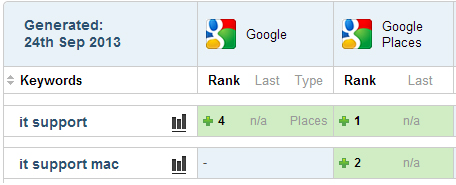 Here at Pam Ann Marketing, we recently did a “local SEO” project for Morristown, NJ-based IT firm Sterling Rose LLC. We did some maps optimization, Schema markup, and citation building for owner Norman Rosenthal to give him a “boost” in regionally-based searches.
Here at Pam Ann Marketing, we recently did a “local SEO” project for Morristown, NJ-based IT firm Sterling Rose LLC. We did some maps optimization, Schema markup, and citation building for owner Norman Rosenthal to give him a “boost” in regionally-based searches.
The Agency Only Lays the Foundation
By implementing these tactics, we laid the foundation for increased local search exposure, but the rest of the work was up to the client. We advised Norm to ask his clients to write reviews for him on his Google Local (Maps) listing to complete the optimization process.
Well, Norm hit the ground running and quickly got 12 (genuine) positive reviews on his Google Local listing. His listing then jumped from position #14 to #1 for “it support” on Google Local, from zero to #2 for “it support mac” on Google Local, and #4 for “it support” in regular (organic) Google search results.
The Client Drove it Home
We love when a client fully embraces our suggestions! But the key takeaway here is that the client has an important role to play in local search optimization efforts. Engaging an agency to provide local SEO services is essential in order to tackle the technical and tedious tasks such as Schema markup and citation building, but no agency can provide the GENUINE positive results needed in order to effectively increase a company’s regional online footprint.
Sure, the agency could ask the client’s customers to write reviews, but the customers won’t be nearly as compelled to do so for some agency they may never have heard of, versus getting a sincere request from the business owner that they have built a mutually-beneficial relationship with.
Reviews HAVE TO BE GENUINE
Yes, I intended to indicate that I’m yelling by capitalizing “HAVE TO BE GENUINE”, because fake online reviews are not only ineffective, but can actually hurt your rankings AND bank account. Both agencies AND clients are being fined up to $100,000 for this local SEO technique, as it is a deceptive advertising practice. Even private lawsuits have begun popping up – Yelp has started to sue both agencies and users for posting fake reviews. At the very least you may suffer irrecoverable algorithmic penalties by the sites such as Yelp that control your online reputation destiny.
Online Reviews are a Company Asset
It should go without saying that keeping your customers satisfied is a preclusion to getting them to write positive reviews. However, many companies are already focused on keeping their clients happy – yet they are not maximizing the payoff of those efforts by solidifying that happiness into a valuable online asset. A set of glowing reviews will grease the gears of the search engines to greatly increase your exposure in regionally-based searches. Combine that with the powerful effect of word-of-mouth, and online reviews practically deserve a place under “assets” on a company’s balance sheet.
What Are Your Review-Recruiting Challenges?
Soliciting reviews isn’t always easy, even from the happiest of customers. Norm will attest to that, but we helped him get over some of those challenges by creating a customized 4-Step Guide to Writing a Google Local Review that he can send to his customers to assist them in the not-very-user-friendly process of writing a Google Local Review.
We also created a shortened URL for his Google Local listing so that he could more easily direct his customers to his listing, instead of having to use the default gobbly-gook URL (yes, that’s a technical term). So don’t get discouraged if you encounter a hurdle or two in this process – there are tips and tricks to get around them.
What challenges have you encountered when trying to solicit online reviews? Leave a comment below and we’ll see if we can help you, too.
- New Domain or Subdomain? Which is Better for SEO? - October 13, 2023
- Bing Chat Roasts & Rap-Battles Google Bard! - March 23, 2023
- The Importance of Developing an SEO Friendly Website Design - October 5, 2021






